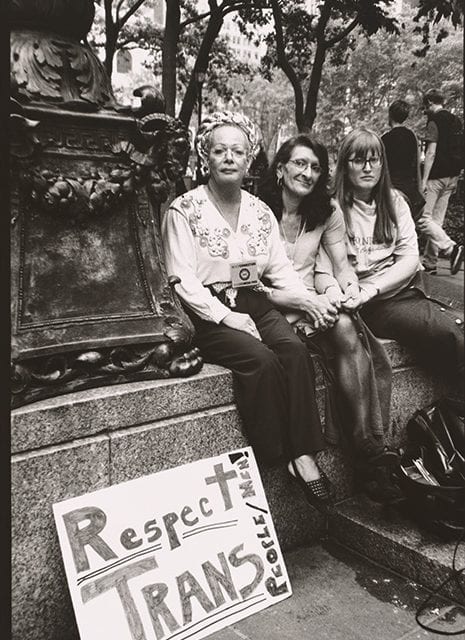
Sylvia Rivera with Christina Hayworth and Julia Murray by Luis Carle, print, 2000. National Portrait Gallery, Smithsonian Institution.
A portrait of Sylvia Rivera — a Latina activist and transwoman who was among those whose arrests at the Stonewall Inn in 1969 sparked the riots that are known as the birth of the modern LGBT rights movement — is now on display in a permanent exhibit at the National Portrait Gallery in Washington, D.C.
The 2000 photograph taken by Luis Carle features Rivera between her partner Julia Murray and fellow activist Christina Hayworth after the 2000 New York City Pride. All three are sitting next to a sign that reads “Respect Trans People/Men!” The photo was taken just two years before Rivera’s death.
The photograph, according to Ana Perry, a former Latino Museum Studies Fellow at the museum, which is part of the Smithsonian Institution, contrasts with the typical Pride parade photograph: “Rather than the bustling energy of the parade with crowds and celebration, this captures a moment of tranquil friendship and unity,” Perry writes on the museum’s Face 2 Face blog.
It also speaks to the trouble Rivera and other transgender activists and individuals, and especially transgender people of color, faced when it came to equal representation in the equality movement.
When mainstream gay and lesbian groups pushed back against transgender participation, people like Rivera pushed forward with their own initiatives. With Marsha Johnson, an African-American transwoman, she started Street Transvestite Action Revolutionaries to highlight trans issues in New York City. They also started the STAR House, a homeless youth shelter with a focus LGBT people of color.
The portrait is on display along with photographs, paintings, sculptures and memorabilia of early and contemporary American activists, including Betty Friedan, Larry Kramer and Margaret Sanger in the exhibit The Struggle for Justice.
Anti-abortion activists and lawmakers recently demanded the gallery remove Sanger’s bust. They objected to her belief in eugenics and her role in founding Planned Parenthood.
The museum declined.














